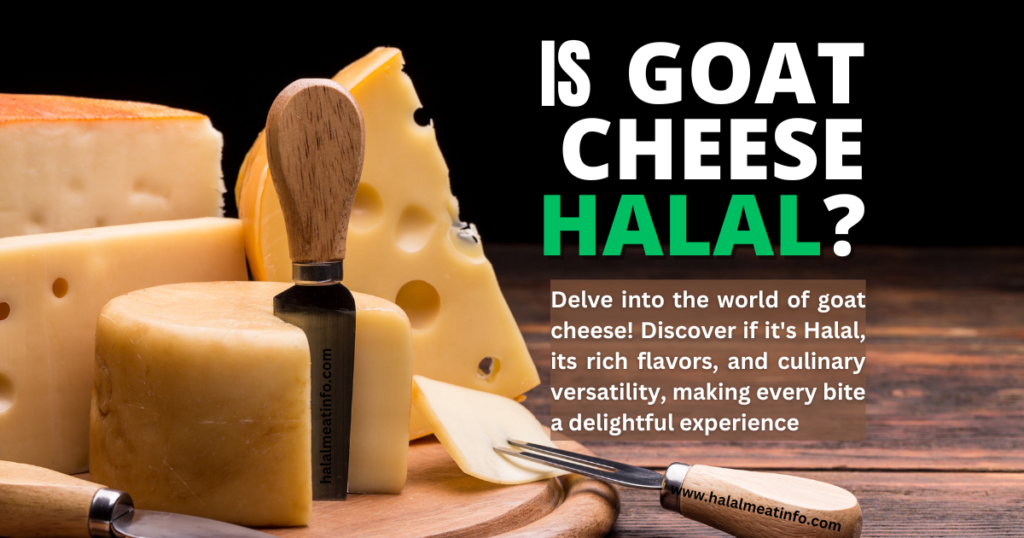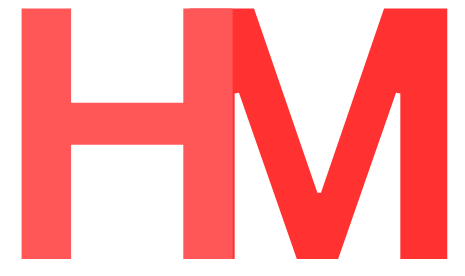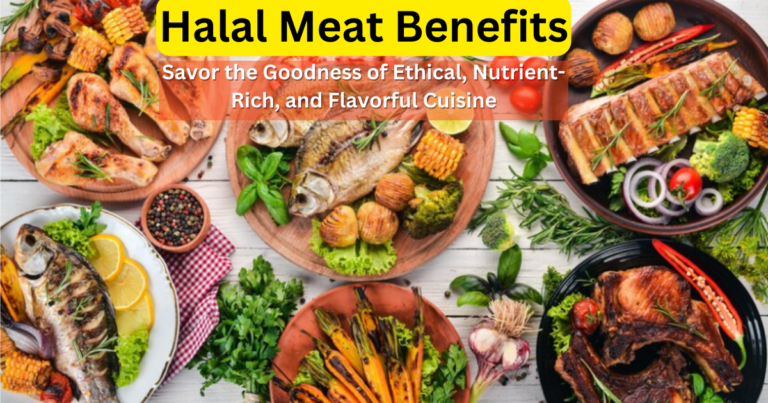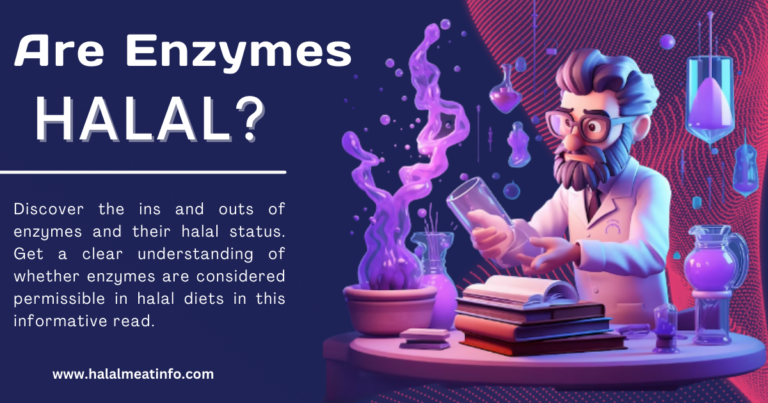Is Goat Cheese Halal? Navigating Dietary Restrictions with Ease
Goat cheese, produced from the milk of goats, has gained a cult-following in recent times due to its unique taste and texture. However, for those observing halal dietary restrictions, the question arises – is goat cheese halal? In this blog post, we will explore the answer to this question and understand what makes a cheese halal.

Understanding Halal
To put it simply, ‘Halal’ is an Arabic term. It means ‘permissible’. This discussion is applicable in many areas of life, but for now, our focus is on food. Dietary laws in Islam define what Halal is. Clean, pure, and not harmful – these are key Halal factors. It is not just about ingredients. The way of preparing food also matters. As we dive deeper into the world of goat cheese, we will apply these criteria. Our goal? To find out whether goat cheese is truly Halal. Let’s start this insightful journey.
What is Goat Cheese?
In French, goat cheese is referred to as ‘chèvre’ and is considered a special treat. It’s a soft cheese that comes from goat’s milk. It stands out for its creamy, distinct taste. A unique tanginess sets goat cheese apart. Furthermore, its production process is quite simple. Initially, fresh milk is curdled, followed by draining to separate the curds from the whey. Subsequently, the curds are what turn into cheese. Given its versatility, goat cheese enriches many dishes. Now, is this cheese Halal? We are on a quest to find out.
The Production of Goat Cheese
The enigma of goat cheese originates at the dairy farm, where goat milk undergoes a fascinating transformation. Let’s unravel the details of this transformation from simple goat’s milk to palatable cheese.
- Firstly, the milk is obtained from goats that are well-treated and kept in clean conditions. This aligns with the Islamic principle of treating animals ethically.
- Next, the milk undergoes pasteurization to eliminate any harmful bacteria. During this process, the milk is heated consistently for a specific period, rendering it safe for consumption.
- After pasteurization, enzymes or rennet are added to the milk, which helps in coagulation. This process is similar to the production of other types of cheese.
- After the milk clots, it’s chopped into tiny portions and drained using cheesecloth. The remaining solid portion is then shaped and aged according to the type of goat cheese being produced.
Benefits of Goat Cheese
Goat cheese, a unique delicacy, offers an array of health advantages. Below are some bullet points highlighting the various benefits that this cheese brings to the table:
- High in Protein: Goat cheese is a fantastic source of high-quality protein, essential for body repair and growth.
- Rich in Calcium: This cheese is packed with calcium, promoting bone strength and dental health.
- Loaded with Healthy Fats: Goat cheese contains healthy fats, contributing to heart health and aiding in nutrient absorption.
- Lower in Lactose: For those sensitive to lactose, goat cheese is a great option. It contains less lactose than cow’s milk cheese.
- Good Source of Probiotics: The cheese boasts a good amount of probiotics, promoting gut health.
- Versatile in Culinary Uses: Its distinctive flavor enriches a variety of dishes, making it a versatile ingredient in the culinary world.
Is Goat Cheese Halal? Analyzing Ingredients and Production Methods
Let’s draw our lens on goat cheese. We focus on its ingredients. We also eye its production methods. How do these hold up against Halal standards? We will call upon experts. We’ll pull up references. Our aim is clear. We want to bring light to this question: “Is Goat Cheese Halal?”
The Milk: Is it Halal?
The milk used in goat cheese production comes from goats. Moreover, goats are halal animals. Additionally, they chew the cud and have a cloven hoof, meeting the criteria set by Islamic dietary laws for meat consumption. However, one key factor that may raise concerns is if the goats were fed non-halal feed or treated with non-halal methods. This is where halal certification comes into play, ensuring that the milk used in goat cheese production follows Islamic dietary guidelines.
The Rennet: Is it Halal?
Rennet, an enzyme derived from the stomach of animals, is a crucial ingredient in cheese-making as it causes milk to curdle. There’s a range of views regarding the acceptability of rennet under Islamic dietary laws. Some scholars state that it is permissible as long as it comes from halal animals. Others believe that any type of animal-derived enzyme should be avoided altogether. To ensure compliance with Halal standards, many manufacturers now use vegetarian alternatives or microbial rennet.
The Production Process: Is it Halal?
The production process of goat cheese itself does not violate any Islamic dietary laws. However, if the production facility also processes non-halal products or if there is cross-contamination during the production process, then it may affect the Halal status of the cheese. Therefore, it is important to look for halal certification on goat cheese packaging to ensure that it has been produced in accordance with Islamic dietary laws.
Expert Opinions on Goat Cheese and Halal Standards
- Dr. Ahmed Afifi, a renowned food scientist and halal consultant, asserts that goat cheese can be considered halal if the rennet used is either plant-based or microbial. He also stresses the need for halal certification to guarantee that the entire production process adheres to Islamic dietary laws.
- Sheikh Yusuf Al-Qaradawi, a prominent Islamic scholar, maintains that rennet derived from animals can be deemed halal provided the animals are slaughtered according to Islamic rituals.
- Imam Khalid Latif, the Executive Director of New York University’s Islamic Center, believes Muslims should aim for clarity in their food decisions. He advises checking for halal certification when purchasing goat cheese to ensure compliance with halal standards.
- Dr. Mian Riaz, Head of the Halal Science Center at Texas A&M University, underscores the criticality of cross-contamination prevention in the production process, emphasizing that manufacturers should have separate production lines for halal products.
- IFANCA, (The Islamic Food and Nutrition Council of America) says, “Goat cheese with microbial rennet is Halal. Additionally, they state, “For Halal compliance, animal-derived rennet would need to be sourced from a Halal-slaughtered animal.”
Compliance with Halal Standards
The production process of goat cheese may seem straightforward, but what makes it Halal? Now, let’s delve into the factors that determine if goat cheese complies with Islamic dietary rules.
- Animal welfare: As mentioned earlier, it is crucial to treat animals ethically in Islam. This involves catering to their basic needs such as food and shelter, and abstaining from any harm or cruelty. In the production of goat cheese, the goats are treated with care and raised in clean environments.
- Ingredients: When producing halal food, it’s crucial to ensure the ingredients used are allowed under Islamic law. As goat cheese is made from only goat’s milk, it meets this requirement.
- Halal certification: Another way to determine if a product is Halal is through certification from recognized Halal authorities. Numerous goat cheese brands possess a Halal certification, assuring customers about their product’s compliance.
Halal Certified Goat Cheese Brands
If you’re on the hunt for halal goat cheese, we’ve got you covered. This section will feature brands that carry the halal certification. You can trust these brands to meet your dietary needs.
List of Halal Certified Goat Cheese Brands:
- Greek Island
- Happy Days Goat Dairy
- Greenfields Milk
- MontChevre
- Saputo Cheese USA Inc.
- Dutch Cheesemasters, LLC
Where to Buy Halal Goat Cheese
It can be procured from specialty stores, markets, or e-commerce sites. Some halal grocery stores may also carry it. Make sure to check for halal certification before purchasing any brand of goat cheese. You can also contact the manufacturers directly to inquire about their production methods and certifications.
Tips for Purchasing Halal Goat Cheese
When purchasing Halal cheese, it’s essential to keep a few things in mind for a smooth and satisfactory experience.
- Check for Halal Certification: The presence of a Halal certification mark on the packaging guarantees that the product meets Islamic dietary laws.
- Research the Brand: A quick online search of the brand can provide information about its commitment to Halal practices and its reputation.
- Read Labels Carefully: Always read labels and ingredient lists. Look out for elements that may not be halal, such as animal-derived rennet from non-halal sources.
- Ask Questions: If in doubt, don’t hesitate to contact the manufacturer directly. After all, they are indeed capable of providing detailed insights about their halal certification and various production techniques.
- Buy from Reputable Stores: Purchase your cheese from reputable stores or online retailers who value quality and authenticity.
- Storage and Handling: Once you’ve brought your Halal goat cheese home, ensure it’s stored separately from non-halal products to prevent cross-contamination.
FAQs
Halal goat cheese is cheese made from the milk of goats that have been raised on halal feed and treated humanely. The cheese is also processed in a way that aligns with Islamic dietary laws.
You can verify if the goat cheese is halal by checking for halal certification markings on its packaging. Additionally, if uncertain, contact the manufacturer directly for clarification.
The status of rennet in accordance with halal standards varies. Initially, some scholars believe it is permissible if derived from halal animals; however, others advise avoidance of animal-derived rennet. Consequently, many manufacturers use plant-based or microbial rennet to ensure halal compliance.
While it is possible, halal goat cheese is more commonly found at specialty stores, halal grocery stores, and online retailers. Always check for halal certification before making a purchase.
To avoid mixing, it is essential to store your halal goat cheese separately from non-halal items. This precaution helps prevent any contact with prohibited substances.
Conclusion
In conclusion, the halal status of goat cheese largely depends on the manufacturing processes and ingredients involved. Ensuring that the rennet used is halal, the cheese is produced in a facility that avoids cross-contamination, and that the product carries a halal certification are key criteria. Consumers need to be vigilant and informed about the products they purchase to ensure they align with Islamic dietary laws. With a growing number of halal-certified brands available, finding halal goat-cheese has become increasingly accessible. By following the tips and guidance shared in this article, you can confidently enjoy the rich and creamy delight of goat cheese while adhering to your halal dietary requirements.






